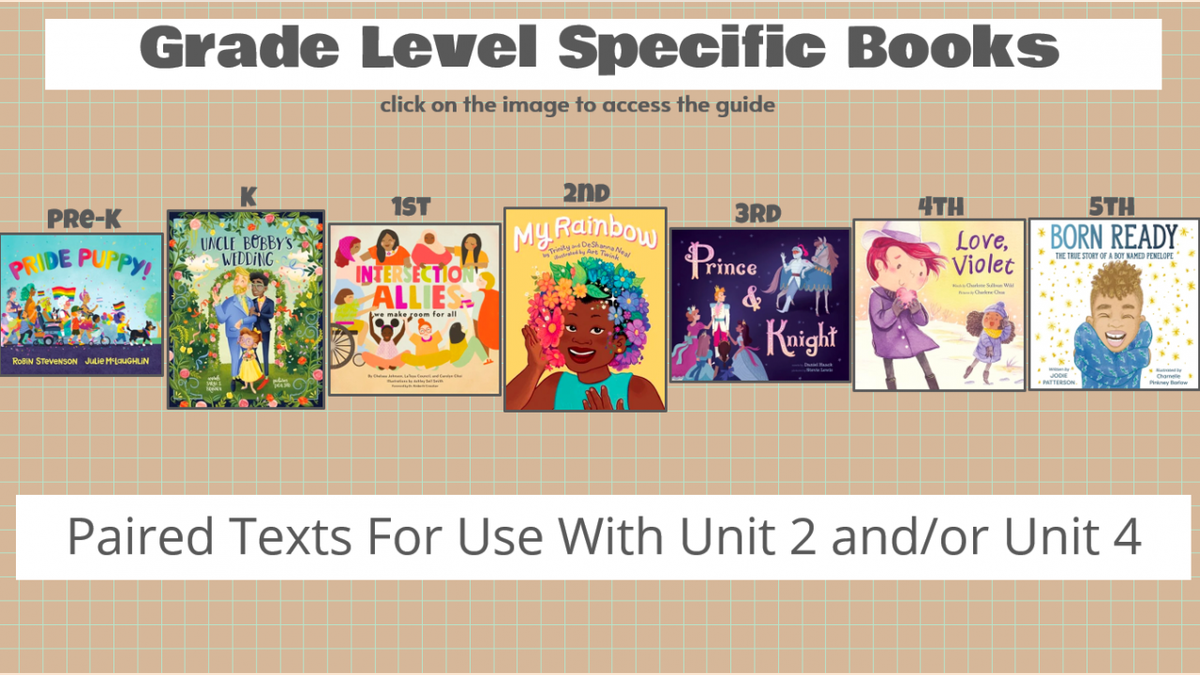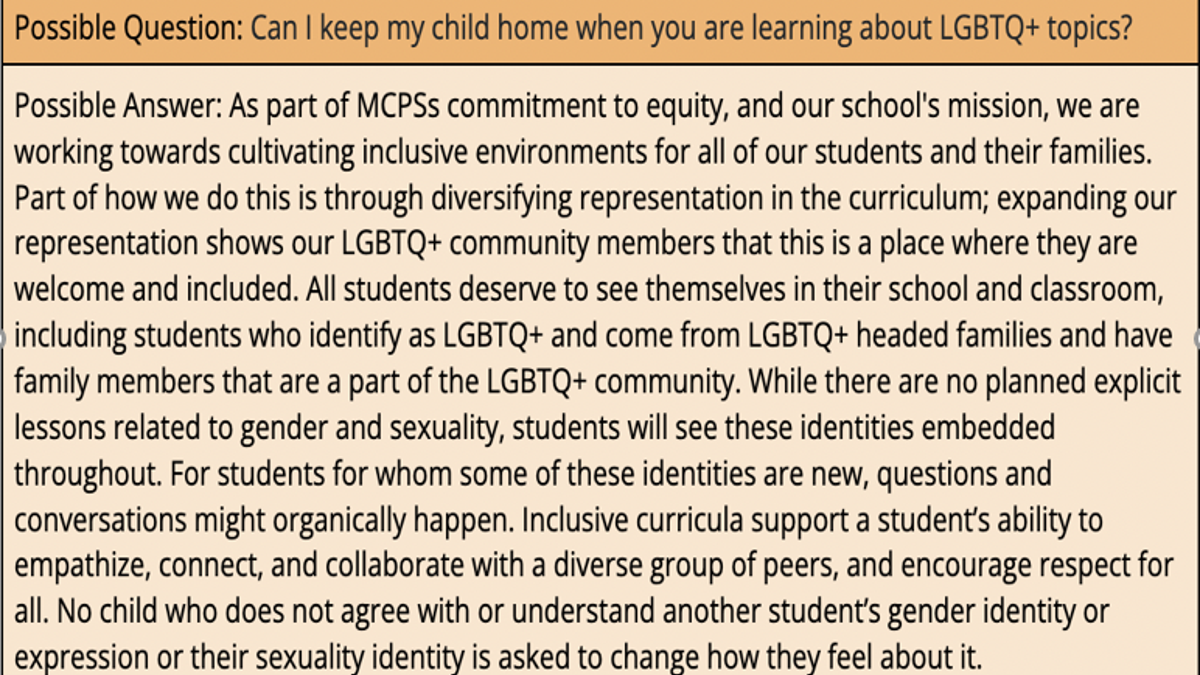Maryland suburb's library hosts interactive drag queen story time
Manhattan Institute fellow Chris Rufo analyzes the latest incident of 'sexualization of children', on 'Tucker Carlson Tonight'.
FIRST ON FOX: Maryland’s wealthiest school district has unveiled a new LGBTQ-inclusive book list for elementary schools that teaches words like "intersex" and "drag queen" to children as young as 4.
A PowerPoint presentation by Montgomery County Public Schools (MCPS) shows a list of LGBTQ+ books that will be provided for pre-K through fifth-grade classrooms this year. The presentation explains that the LGBTQ-inclusive reading list aims to "reduce stigmatization and marginalization of transgender and gender nonconforming students."
"All students deserve to see themselves in their school and classroom, including students who identify as LGBTQ+ and come from LGBTQ+ headed families and have family members that are a part of the LGBTQ+ community," the presentation states. "There are no planned explicit lessons related to gender and sexuality, but these books do mean that LGBTQ+ identities will be made visible. Inclusive curricula support a student’s ability to empathize, connect, and collaborate with a diverse group of peers, and encourage respect for all."
"No child, or adult, who does not agree with or understand another student’s gender identity or expression or their sexuality identity is asked to change how they feel about it," it adds.

Montgomery County Public Schools has unveiled its new LGBTQ-inclusive book list for elementary schools, which is not mandatory reading and teaches words like "intersex" and "drag queen" to children as young as 4. (Montgomery County Public Schools)
FLORIDA SCHOOL'S SEX-ED FOR 6TH-GRADERS DESCRIBES GIRLS AS ‘PEOPLE WITH A VULVA'
The presentation was apparently part of a professional development workshop for MCPS staff held in August about "Building Community with LGBTQ+ Affirming Picture Books." One of the slides stated, "Use five of the books by the end of December."
The book that MCPS has recommended for children in pre-kindergarten is "Pride Puppy," which teaches terms like "intersex," "drag king," "drag queen" and "Marsha P. Johnson," the late famed drag performer.
Pre-K teachers are also provided a resource guide about "defining LGBTQ+ words for elementary students" by the Human Rights Campaign, which includes vocabulary like "cisgender," "gender binary," "transgender," "pansexual" and "queer."
Students in kindergarten, ages 5 and 6, are advised to read the 2021 book, "Uncle Bobby’s Wedding," which is about a wedding between two men.
"Students will recognize that people’s multiple identities interact and create unique and complex individuals," the MCPS guide states.
LOS ANGELES PUBLIC SCHOOLS TRAINING TEACHERS THAT ‘MERIT,’ ‘INDIVIDUALISM’ ROOTED IN ‘WHITENESS’
Students in first grade are advised to read "IntersectionAllies: We Make Room for All," which includes LGBTQ+ topics on being "non-binary" and deciding "what pronouns fit you best."
"Students will recognize their own responsibility to stand up to exclusion, prejudice and injustice," the guide states.
Students in second grade, ages 7 and 8, are recommended to read "My Rainbow," a book about a Black transgender child that teaches the words "transgender" and "cisgender." A "think aloud" moment, according to MCPS, includes, "Appreciating that Trinity’s identities are part of what make her a 'masterpiece.'"
"Students will recognize unfairness on the individual level (e.g., biased speech) and injustice at the institutional or systemic level (e.g., discrimination)," the guide states.
Third-graders, ages 8 and 9, are recommended to read the 2018 book "Prince & Knight," which tells the story of a prince who falls in love with a knight.
The objective of that book is for students to "be able to describe characters’ traits, motivations and feelings in a story," MCPS states.
"Some think aloud moments" for the book, according to MCPS, include, "Noticing that the prince doesn’t seem happy about all the princesses trying to get his attention," "wondering how he might feel about the pressure his parents are putting on him to find a princess" and "appreciating that when the prince is saved by the knight, we see him smile for the first time."
Fourth-graders are recommended to read the 2022 book "Love, Violet," which tells the story of a queer child who develops a crush on her friend, Mira.
A "think aloud" moment for that book is "acknowledging how uncomfortable we might [be] in situations when we feel our heart beating ‘thumpity thump’ & how hard it can be [to] talk about our feelings with someone that we don’t just ‘like’ but we ‘like like,’" according to MCPS.
"Students will develop language and knowledge to accurately and respectfully describe how people (including themselves) are both similar to and different from each other and others in their identity groups," the guide states.
Students in fifth-grade, ages 10 and 11, are advised to read "Born Ready," which tells the story of a Black transgender child.
"Some think aloud moments," for that book, according to MCPS, include, "noticing how happy Penelope is when his mom hears him and commits to sharing with their loved ones that he is a boy--say again that we know ourselves best" and "noticing that in Ghana they think about gender differently than we do in the US--wondering why is it such a big deal here?"
The presentation provides several examples of potential complaints from students, parents and community members and how MCPS staff should respond.
"That’s weird," reads a sample comment from a student. "He can’t be a boy if he was born a girl. What body parts do they have?"
The answer suggested by MCPS states: "That comment is hurtful; we shouldn’t use negative words to talk about peoples’ identities. Sometimes when we learn information that is different from what we always thought, it can be confusing and hard to process. When we are born, people make a guess about our gender and label us ‘boy’ or ‘girl’ based on our body parts. Sometimes they’re right, and sometimes they’re wrong. Our body parts do not decide our gender. Our gender comes from inside – we might feel different than what people tell us we are. We know ourselves best."

If a parent asks whether they can keep their child home during the LGBTQ+ readings, MCPS faculty are advised to explain that no effort will be made to persuade a child from holding certain beliefs. (Montgomery County Public Schools)
In a statement to Fox News Digital, MCPS insisted the readings are not mandatory and that they will not be scheduled for use until families are notified.
However, the original MCPS presentation includes a guide on "Responding to Caregivers/Community Questions," and two of the example questions include, "Why can’t I opt out of this…" and "Can I keep my child home…," and neither of the example answers to those questions included saying that families can opt out.
In fact, if a parent asks why they "can’t" opt their children out of the readings like they can with sexual health-related topics, MCPS staff are advised to explain that the readings are about "diversity" not anatomy.
"During Family Health & Life, we are learning about scientific topics like biology, anatomy, puberty and reproduction," the sample response states. "In these picture books and discussions, students are learning about the diversity of identities that exist in the world and in our classroom; we are not getting into any of the scientific specifics. This is similar to when we’re learning about different races, ethnicities and religions which are other social identities commonly talked about in school. All children and their families deserve to see themselves and their families positively represented in our school community."
If a parent asks whether they can keep their child home during the LGBTQ+ readings, MCPS faculty are advised to explain that no effort will be made to persuade a child from holding certain beliefs.
"While there are no planned, explicit lessons related to gender and sexuality, students will see these identities embedded throughout," the sample response states. "For students for whom some of these identities are new, questions and conversations might organically happen. Inclusive curricula support a student’s ability to empathize, connect, and collaborate with a diverse group of peers, and encourage respect for all. No child who does not agree with or understand another student’s, gender, identity or expression, or their sexuality identity is asked to change how they feel about it."
CLICK HERE TO GET THE FOX NEWS APP
MCPS told Fox News Digital that "these books are a way to actualize the policy and guidelines and have undergone a rigorous evaluation process. All the content within them is age and developmentally-appropriate."
"MCPS is committed to ensuring all students and their families see themselves in the curriculum to cultivate an inclusive and welcoming learning environment," the school district continued. "These books are not mandatory. These books are on the approved list of supplemental materials schools will have access to that align with our goal of providing more inclusive texts and resources in support of curriculum standards. As is our standard practice, these materials are not scheduled for use until system-wide communication has been sent to families."
"As part of MCPS' mission to equity, ‘instructional materials are chosen to reflect the diversity of our global community, the aspirations, issues and achievements of women, persons with disabilities, persons from diverse, racial, ethnic, and cultural backgrounds, as well as persons of diverse gender identity, gender expression, or sexual orientation,'" it added.





